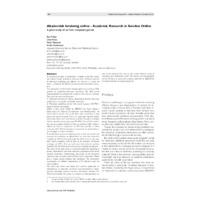Akademisk forskning online - Academic Research in Sweden Online
Metadata
Akademisk forskning online - Academic Research in Sweden Online
An increasing number of universities in Sweden make their university research results available in electronic form. Technical solutions for electronic publishing are different, but the aim is the same - to facilitate the efficient discovery and dissemination of content. Five universities in Sweden have already agreed on a common XML schema for publishing electronic documents. The DiVA portal (http://publications.uu.se/portal/) is built on this common schema. The portal has two main functions 1. Federated searching for theses, dissertations & other electronic publications at a number of Swedish universities 2. Metadata publishing service (the portal supports OAI-PMH-based metadata harvesting). Within a pilot study funded by BIBSAM (the Royal Library´s Department for National Co-ordination and Development), we tried to find a solution that would allow other universities to take part in the common portal. That is, to make their research results, particularly theses and dissertations, available through a catalogue built by metadata harvesting using OAI-PMH. Some of the universities use very simple solutions or have no technical staff, making it difficult for them to implement an OAI data provider. In these cases, for which OAI harvesting is not practical, we tested alternative strategies to collect metadata. To enable these archives to enhance access to their documents and increase the availability, we offered them to make their metadata available for OAI harvesting through the DiVA portal. In this way, even 'small' publishers could be part of, for example, OAI-based catalogue of ETD's. That we could reuse the technical solutions developed for the DiVA portal was one of our starting assumptions. The result of this pilot study is a portal for federated searching of theses, dissertations, and other electronic publications from seven Swedish universities. Unfortunately, the quality of the harvested metadata does not allow reuse of DiVA portal components. Therefore, a simple search interface was developed. The inconsistent vocabularies and different interpretation of DC elements were the main problems. This case study shows very clearly that common agreement on interpretation of metadata standards and vocabularies is necessary for meaningful resource discovery. Achieving a national system that facilitates this access is a question of interoperability not only on the technical, but also on the semantic level. This question of interoperability will be the focus of some new projects, submitted to BIBSAM for immediate decision on supporting grants.
2003

